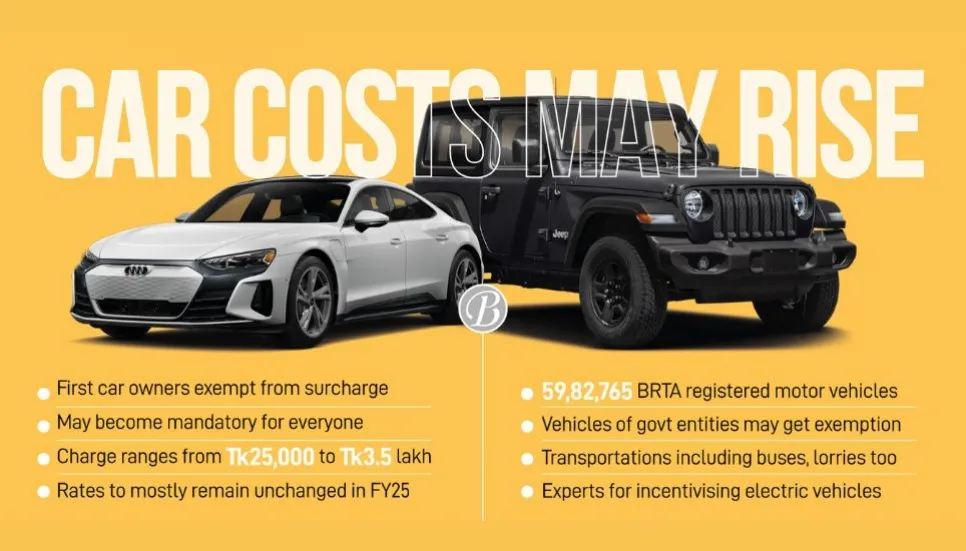
Any individual, company, or taxable entity planning to buy their first car will now have to take into account the possibility of paying a mandatory surcharge starting from FY2024-25, which the first-time car owners are currently exempt from.
The government is likely to propose this surcharge on every car owner in the upcoming fiscal year, in a bid to curb a loophole allowing any person to buy multiple cars and register them to different members of their family or companies to evade the surcharge.
This measure will ultimately contain carbon emissions, air pollution, discourage car usages and increase government’s revenue, according to finance ministry sources involved in budget formulation.
In FY24, the National Board of Revenue (NBR) introduced an environmental surcharge for individuals, companies and all taxable entities that own multiple cars. This is applicable from second and subsequent cars, meaning owners do not have to pay for the first one.
The cars can be passenger cars, jeeps and microbuses, and the surcharge ranges between Tk 25,000 to Tk 3.5 lakh depending on their engine capacity. Public and goods transportations such as buses, minibuses, trucks, lorries, and pick up vans are exempt from paying the surcharge.
However, the government has been losing revenue due to the loophole mentioned above, and the surcharge has mostly been ineffective in discouraging vehicle usages in the country in favour of public transportation systems, officials say.
So, in the upcoming budget, the government plans to impose this surcharge even on first-time car owners, and the move will reduce pressure on forex reserves. The surcharge rate will likely be the same as existing provisions for multiple cars based on engine capacity.
Taxpayers who own more than one car are subject to an additional surcharge when registering and renewing a second vehicle at source.
The owner of a car having up to 1,500cc or 75-kilowatt engines is subject to pay Tk 25,000 as environmental surcharge. The surcharge is doubled to Tk 50,000 for a car having the engine capacity of 1501cc to 2,000cc or more than 75kW to 100kW.
Owners having a second car with a capacity of 2,001cc to 2,500cc or 101kW to 125kW will have to pay Tk 75,000.
A surcharge of Tk 1.5 lakh is applicable for owners of multiple cars with a capacity of 2,501cc to 3,000cc or 125kW to 150kW, and Tk 2 lakh for cars having engines over 3,000cc and Tk 3.5 lakh for cars with 3,500cc or 175kw and above engine capacity.
Govt entities likely to be exempt
Government entities which are not bound to submit returns will not have to pay this surcharge on vehicle purchase.
Experts say the provision will create discrimination between public and private entities, and further increase public expenditure on cars.
The Bangladesh Road Transport Authority (BRTA) had recently informed the NBR in a letter that it is facing difficulties in collecting surcharges against multiple vehicles owned by the government and tax-exempt entities, as they do not have tax identification numbers.
The BRTA’s existing software cannot identify the number of vehicles owned by tax-exempt entities, so the NBR exemption facility from environment surcharge for them.
According to latest data from the BRTA, there are 4,10,532 private passenger cars, 91,304 jeeps and 1,21,387 microbuses registered in the country, and the number of BRTA registered motor vehicles is 59,82,765 until January this year.
Incentivise electric cars, charging stations
Experts call for incentivising electric cars by lifting all duties, and investing on the installation of electric car charging stations across the country reduce carbon emissions and forex crunch.
Policy Research Institute of Bangladesh (PRI) Executive Director Ahsan H Mansur told The Business Post, “Such a tax cannot be the only solution, and the government will also have to incentivise electric cars and invest in natural energy sources.
“The government plans to impose carbon tax as an environmental surcharge. So, revenue is not a matter there and by this provision, the government will not earn more revenue.”
He added, “I recommend 100 per cent tax break on electric cars, 70 per cent on hybrid cars, and 100 per cent tax on patrol and diesel cars to reduce emission as greenhouse gas emissions.
“The government will also have to invest in electric vehicle charging stations as we will gradually move to renewable energy sources. Currently, the government has a plan to increase power from renewable energy sources to at least 12,000 MW. It can also bind petrol pump stations to set up charging stations for renewing their licenses and provide tax benefits.”
Mansur pointed out, “The NBR does not provide government vehicles and there is a budget for procurement. Then, why does the NBR provide exemptions for them? The government actually wants to appease bureaucrats, and this is the problem.”